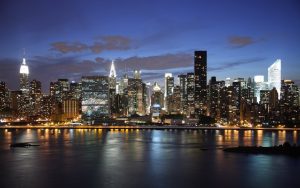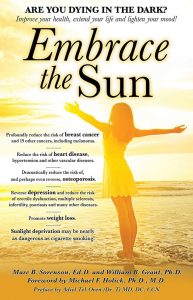 An innate need for sunlight exists within the human body and soul.
An innate need for sunlight exists within the human body and soul.
First of all, consider the opening line of a recent article in the New York Times: “Let there be light. Please.” And, the article states that people in New York City (NYC) love to seek apartments with sunlight. It is also especially relevant that such apartments demand premium prices. But sun seekers have a problem because of the continuous building of new high rises. Consequently, they must look at the city’s future building plans before they fulfill their innate need for sunlight. This is because new buildings may be built that block whatever sunlight is available.
Problems encountered in fulfilling the innate need for sunlight in NYC.
Therefore, it is a difficult situation to satisfy the innate need for sunlight in NYC. And no wonder people in the southern states have lower cancer rates, despite their atrocious eating habits.[1] Why? Because they have one of the best cancer fighters: sunlight.
An example of the rather impressive anti-cancer power of sunlight: Iranian research demonstrated the innate need for sunlight. Women who avoided sun exposure had 10 times the breast cancer risk.[2] That is, of course, when they were compared to women who were able to obtain regular sunlight. This is because the innate need for sunlight was being ignored among women forced to avoid sun.
What other diseases are manifest when we ignore our innate need for sunlight?
Lack of sun exposure increases the risk of 16 other cancers, heart disease, vitamin D deficiency, multiple sclerosis, hip fractures, depression and myriad others. (See my book, Embrace the Sun, for a full discussion.) The innate need for sunlight manifests itself in higher rates of these “killer” diseases worldwide.
According to the NYT article, “there are those who view light as an elemental need, one that trumps everything else, including location, closets, level floors, an elevator, a doorman and proximity to Trader Joe’s.” Obviously, the people recognize, at a visceral level, their innate need for sunlight.
Do the Chinese have an innate need for sunlight?
Another article also emphasized the innate need for sunlight.[3] And, this one came from halfway around the world, in Shanghai. It seems like the Chinese should know about sun healing, since their experience in healing goes back thousands of years. Hence, they would not need to read this article to appreciate the innate need for sunlight. A real-estate developer there had to pay a family the equivalent of $15,650.00 for robbing them of their sun. One of the developer’s skyscrapers exceeded the legal height, and partially blocked the sun to their apartment. Consequently, this prevented the family from obtaining their government-mandated sun allotment. The allotment was two hours per day, and the skyscraper allowed only 1-2 hours of sun.
A judge who understands the innate need for sunlight
The judge in the case said, “We can’t live without sunshine” and told the developers they had to respect the rights of the people to enjoy the sun. Due to this judge’s understanding of the innate need for sunlight, justice was done.
Why is the innate need for sunlight not recognized in the U.S? Good question!
The Chinese experience is in stark contrast with the US. First of all, in the 1990s, a president of the American Academy of Dermatology (AAD) made this statement. “In some vision as I grow older I see us moving to more shelters and perhaps underground living because of these hazards” (meaning sun exposure).[4] Also, she stated that melanoma would cause more cancer deaths than any other cancer by about 2010. Since it is now 2018, and we are not yet living underground, she was ridiculously wrong. In addition, melanoma is nowhere near the top of the cancer-deaths charts. It kills far less people than most major cancers like lung, breast, colon and prostate. However, it will probably increase in incidence as more people are convinced by the ADD to avoid their innate need for sunlight.
When it comes to the innate need for sunlight, the Chinese have more smarts!
It appears that the Chinese are a whole lot smarter than the AAD regarding the innate need for sunlight! Therefore, the AAD’s insistence on sun avoidance is likely to destroy public health. And, soaking up some safe, unobstructed, regular sunlight will enhance health. The AAD’s insistence on sun avoidance is much more likely to destroy the health of the American public than soaking up some unobstructed sunshine. So please, PLEASE enjoy some safe, non-burning sun, winter and summer, while you improve your health! And remember that sunscreens inhibit 95% of vitamin D production. Therefore, when you have had enough sun exposure, cover up with clothing or seek shade. Those who use sunscreens have far more sunburns than those who do not use it.[5] Think about it, and read my book, Embrace the Sun so that you can be comfortable while attending to your innate need for sunlight. https://www.amazon.com/Embrace-Sun-Marc-B-Sorenson/dp/069207600X 
[1] Sorenson, M. Vitamin D3 and Solar Power. Chapter 8. 2008.
[2] Bidgoli SA, Azarshab H. Role of vitamin D deficiency and lack of sun exposure in the incidence of premenopausal breast cancer: a case control study in Sabzevar, Iran. Asian Pac J Cancer Prev. 2014;15(8):3391-6.
[3] http://www.shanghaidaily.com/national/Sun-suit-Family-wins-payout/shdaily.shtml
[4] Dr. Wilma Bergfeld, then-president of the American Academy of Dermatology at Derm Update, the AAD’s 1996 annual media day, Nov. 13, 1996.
[5] Silva ESD, Tavares R, Paulitsch FDS, Zhang L. Use of sunscreen and risk of melanoma and non-melanoma skin cancer: a systematic review and meta-analysis. Eur J Dermatol. 2018 Apr 1;28(2):186-201.
